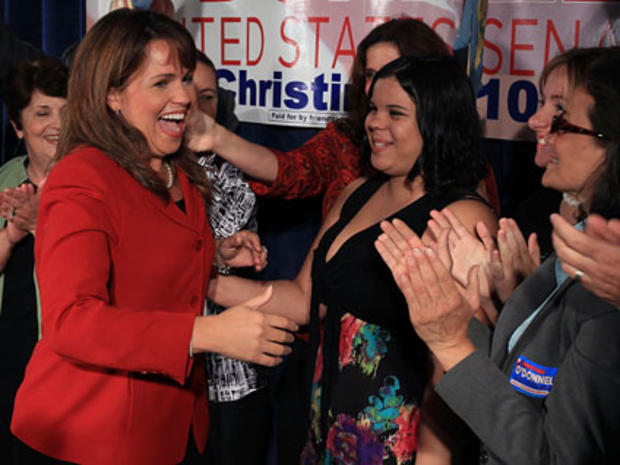Keeping the Primaries in Perspective
There's no question that the primary season has produced a significant storyline: the defeat of a spate of Republican incumbents and "official" candidates at the hands of voters determined to choose a different breed of candidate.
The story actually began well over a year ago, when Pennsylvania Senator Arlen Specter, one of the shrinking field of Republican Senate moderates, saw himself facing certain defeat in the primary and fled to the Democratic party in an effort to salvage his career. (It didn't work; he lost the Democratic primary back in June).
This spring it was Florida governor Charlie Crist's turn; he was widely expected to win the open Republican Senate seat, but when ex-Florida House Speaker Marco Rubio took a huge lead by assailing Crist for his occasional cooperation with President Obama, Crist left the GOP to run as an independent. (The latest polls show him trailing Rubio).
Then came a rash of upsets from one end of the country to the other: three-term Utah Sen. Robert Bennett was denied even the chance to run in the primary at the state GOP convention. His sin: voting for bailouts and working with Senate Democrats on a health-care compromise. In Kentucky, Colorado, Nevada, Alaska, and now Delaware, the candidates chosen by the party machinery all fell to those backed by the amorphous "tea party" movement and--in many cases--by ex-Alaska governor Sarah Palin.
As we swing into the general election, here are some questions worth pondering:
Have these "tea party" victories jeopardized Republican chances to win the Senate?
Yes, in the sense that defeated candidates like Rep. Mike Castle in Delaware and Sue Lowden in Nevada were measurably stronger November candidates. But for most tea-party adherents, that's beside the point. Their intense opposition to the size and spending practices of the federal government was not a partisan matter; they were equally angry at the spending practices of President Bush and the Republican Congress in recent years. For these voters, Republicans who did not fight such spending, who instead boasted of the dollars they brought back home, were part of the problem.
Does the "tea party" label mean trouble for Republicans in the fall?
We don't know yet; because while voters by a 23 percent - 29 percent margin have an unfavorable view of the movement, the biggest number has no opinion. If these candidates can broaden their appeals to a wider audience, and ease up on some of the more provocative ideas ("phasing out" social security and Medicare, ending popular election of U.S. senators), the negative elements of that label may not matter. If Democratic opponents can define tea party candidates as "out there," the label will indeed be a burden.
What about the "Palin factor"?
It's clear that her endorsement of Joe Miller in Alaska and Christine O'Donnell in Delaware mattered. While she remains a polarizing figure nationally, with more negatives than positives, she is extremely popular within the Republican base and her endorsement was a key factor in ginning up money and volunteers in those races.
But do not forget how small the numbers were: in Alaska, Miller beat Murkowski by some 1,700 votes. In Delaware, the margin was 3,500 votes. By contrast, the total vote in the 2010 midterms was just above sixty million. It is a reasonable assumption that the Palin factor in November will have a very different cast to it.
GOP Senate Takeover Less Likely After Tea Party Win
Washington Unplugged: Tea Party Coup
Mike Castle Won't Endorse Christine O'Donnell
What is the Tea Party Movement?
O'Donnell's Win in Delaware "Reenergized" Chris Coons' Supporters
Interactive Map: CBS News Election 2010 Race Ratings

